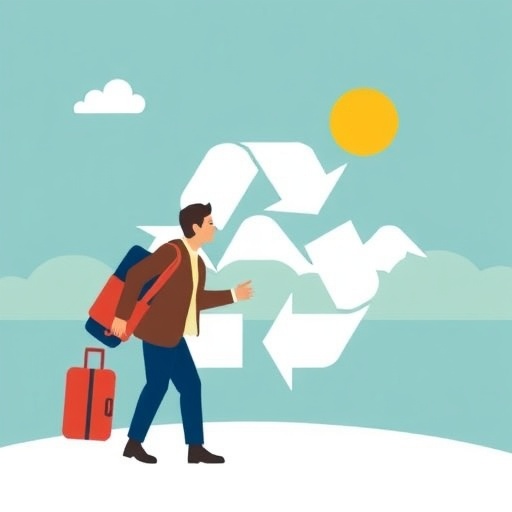Starting university marks more than a physical relocation or a shift in academic focus for young adults; it serves as a transformative period that fundamentally reshapes personal habits and lifestyle decisions. Recent research conducted by the Centre for Climate Change and Social Transformations (CAST) at the University of Bath underscores this phenomenon, revealing how major life transitions act as catalysts for the adoption of environmentally sustainable behaviors among youth. By leveraging detailed longitudinal survey data, the study offers an unprecedented look at how new environments and disruptions can be harnessed to foster greener routines.
The research, published in the journal PLOS Climate, employed a robust methodological framework that tracked several hundred individuals aged 16 to 24 through two pivotal “moments of change”: the transition from secondary education to university life, and the profound societal upheaval triggered by the COVID-19 pandemic. Both events serve as natural experiments illustrating how external shocks and altered daily rhythms can engender novel opportunities for pro-environmental engagements while simultaneously imposing constraints. Such analysis paves the way for targeted interventions that could optimize green behavior uptake.
Focusing initially on the university transition, the study identifies significant shifts in behaviors indicative of environmental responsibility. Students reported substantial increases in recycling rates and active travel modes, such as walking and cycling. These behavioral modifications not only reflect adaptation to new physical surroundings but also reveal emergent value orientations toward sustainability. Moreover, reductions in the consumption of meat and dairy products were observed, signaling an alignment with dietary choices known to mitigate carbon footprints. Yet, intriguingly, the researchers find declines in ethical shopping and environmental activism during this adjustment period, suggesting complex trade-offs in how students prioritize their commitments amid evolving academic and social demands.
The analysis extends to the COVID-19 pandemic as a second critical pivot point. Lockdown measures introduced constraints impeding movement and social gatherings, which inherently limited opportunities for active travel and activism. Despite these restrictions, respondents reported marked reductions in food waste and a continued decline in animal product consumption. This dichotomy illustrates how enforced routine disruptions can simultaneously challenge and enable different dimensions of eco-friendly behavior, highlighting the nuanced interplay between context, agency, and environmental action.
Central to the findings is the recognition that individual values substantially influence the likelihood of engaging in sustainable practices. Participants who expressed stronger concerns for environmental protection and social welfare were disproportionately more apt to incorporate green behaviors into their lives. However, the study cautions that such values, while necessary, are insufficient standalone motivators. Without the scaffolding of supportive infrastructure—ranging from physical amenities like cycling paths to institutional campaigns promoting sustainable living—well-intentioned behaviors may falter. This underscores the critical role of systemic facilitation alongside personal motivation in realizing meaningful behavior change.
The lead author, Dr. Kaloyan Mitev, an environmental psychologist and behavioral scientist at CAST, articulates this intricate dynamic succinctly: “Big life changes shake up our habits. That disruption can be a golden opportunity to go greener but only if the right support is there.” His insight foregrounds the importance of timely interventions, urging policymakers and educational institutions to capitalize on transitional moments by fostering environments conducive to sustainability. Such measures could include investing in enhanced cycling infrastructure on campus, developing greener housing options for students, and orchestrating targeted awareness campaigns aimed at reducing food waste and lowering carbon footprints.
Co-author Professor Lorraine Whitmarsh, CAST Co-Director, adds another dimension by highlighting the potency of life transitions as strategic points for policy action: “Life transitions, from leaving home to starting a job, are powerful moments to encourage greener habits. Targeted interventions at these points could make a real difference in tackling climate change.” This perspective advocates for a lifecycle approach to behavioral change, where interventions are synchronized with individuals’ evolving life stages to maximize efficacy and sustainability.
Methodologically, the research utilized comprehensive surveys combining quantitative and qualitative elements to capture behavioral trajectories and underlying psychological determinants over time. The methodological rigor reinforces the validity of observed trends and enables nuanced understanding of the contextual factors mediating behavior change. By emphasizing early adulthood—a developmental phase marked by identity formation and independence—the study identifies a critical window for embedding environmentally constructive behaviors that can persist into later life stages.
The complex behavioral landscape illuminated by the pandemic further enriches understanding of how external shocks recalibrate routines and values. While restrictions curtailed some pro-environmental activities, new practices such as conscious food management and dietary shifts gained momentum. These findings highlight the adaptability of young adults in response to structural constraints and suggest that resilient sustainability behaviors can emerge even in adverse conditions when appropriately supported.
Importantly, the researchers underscore the role of universities as key actors in shaping sustainable futures. Given their influence over young adults’ living environments and social norms, academic institutions are uniquely positioned to function as incubators of pro-environmental behavior. Integrating sustainable infrastructure and programming within campus culture can reinforce green habits formed during critical transition phases, leading to broader societal benefits in combating climate change.
The broader implications of this research suggest that major life transitions represent strategic leverage points for climate action. By understanding the psychological, structural, and contextual variables influencing behavior change during these periods, stakeholders—including government bodies, educational institutions, and community organizations—can design and implement more effective sustainability interventions. Such transformative approaches are essential to accelerating the global shift toward environmentally responsible living.
Finally, this study’s contribution to social and environmental sciences extends beyond descriptive insights; it provides actionable intelligence to guide policy formulation that aligns with behavioral science principles. Emphasizing the synergy between personal values and systemic supports lays the groundwork for comprehensive strategies that enhance environmental stewardship during formative life stages. As the climate crisis intensifies, harnessing the momentum generated during life transitions could prove pivotal in mobilizing the next generation for sustainable action.
Subject of Research: People
Article Title: Shifting horizons: Significant life events and pro-environmental behaviour change in early adulthood
News Publication Date: 15-Oct-2025
Keywords: Environmentalism, Social movements, Sociology, Social research, Social surveys, Social attitudes, Environmental issues, Climate change




